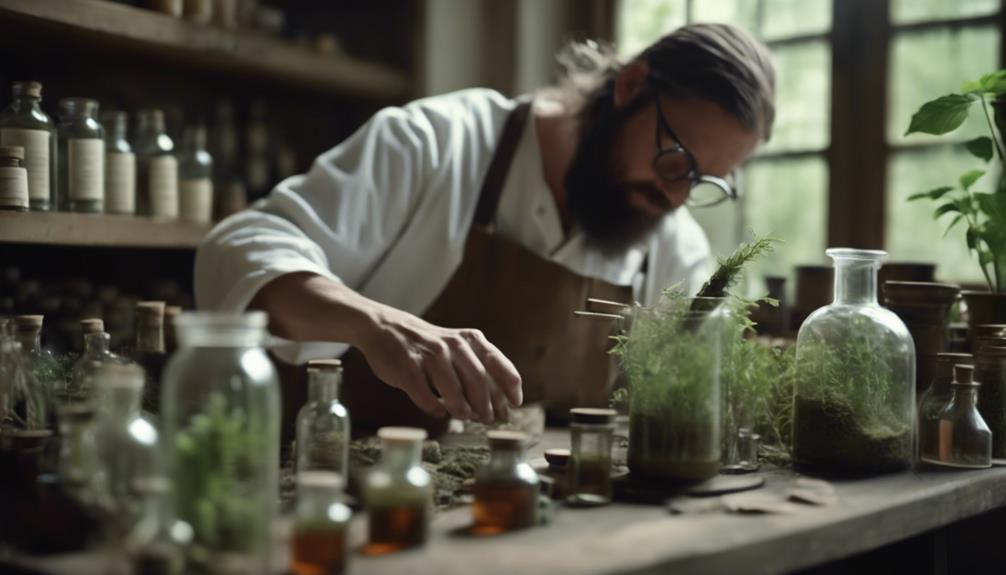Apothecaries are trained in pharmacy practices, focusing on precise medication dispensing in traditional medical facilities. They hold a Bachelor's Degree, alongside pharmacy licenses, and offer standardized medications and patient care. On the other hand, herbalists specialize in utilizing herbs for healing in alternative health centers. With a deep understanding of medicinal plants, they create personalized herbal formulas for holistic health. Herbalists often lack standardized guidelines and seek additional certifications, while apothecaries are regulated by state pharmacy boards. The key differences lie in their educational background, treatment approaches, practice settings, and regulatory oversight, shaping distinct paths in the fields of botanical medicine and pharmacy practices.
Key Takeaways
- Apothecaries focus on dispensing standardized medications in pharmacy settings.
- Herbalists specialize in using herbs and natural remedies for holistic healing.
- Apothecaries require licensing for pharmacy operations.
- Herbalists tailor custom herbal formulas for individual health needs.
- Apothecaries are regulated by state pharmacy boards, while herbalists lack standardized guidelines.
Scope of Practice
In our discussion of the scope of practice, herbalists primarily focus on utilizing herbs and natural remedies for healing and well-being. Herbalists specialize in harnessing the medicinal properties of various plants to create herbal formulations that promote health in a holistic manner. Their expertise lies in understanding the therapeutic effects of different herbs and how to best utilize them to address a wide range of health concerns.
Herbal medicine is at the core of their practice, emphasizing the use of natural remedies to support the body's healing processes.
Herbalists often cultivate a deep knowledge of botanical medicine, learning how specific herbs can interact with the body to provide therapeutic benefits. They carefully select herbs based on their medicinal properties and combine them in unique formulations tailored to individual needs.
Educational Background

The educational background of herbalists and apothecaries greatly influences their expertise in botanical medicine and pharmacy practices, respectively. Herbalists commonly hold a Bachelor's Degree (51%) as their most prevalent qualification, focusing on holistic health and plant-based remedies.
In contrast, all apothecaries possess a Bachelor's Degree (100%) and are trained in pharmacy practices, with a specialization in medication preparation and dispensing.
Herbalists may further enhance their knowledge by pursuing additional certifications in herbal medicine, while apothecaries typically obtain licenses for pharmacy operations. Both professions demand extensive education to comprehend the intricacies of herbal and pharmaceutical treatments, ensuring a thorough understanding of the complexities involved in botanical medicine and pharmacy practices.
The differing educational paths of herbalists and apothecaries equip them with the necessary skills and knowledge to excel in their respective fields, with herbalists focusing on holistic healing through herbal remedies and apothecaries specializing in the precise preparation and dispensing of medications.
Treatment Approaches

When considering treatment approaches, apothecaries focus on the precise dispensing and distribution of medications, while herbalists specialize in utilizing herbs and natural remedies for healing purposes. Apothecaries typically provide standardized medications, whereas herbalists often create custom herbal formulas tailored to individual needs.
Additionally, apothecaries may offer services such as immunization programs and prescription filling, aligning with their pharmaceutical-based approach. In contrast, herbalists concentrate on herbal preparations and holistic healing methods centered around the healing properties of plants.
Apothecaries may also deal with compounding medications and drug interactions, broadening their scope beyond just dispensing medicines. On the other hand, herbalists emphasize the use of herbs and natural remedies for medicinal purposes, focusing solely on natural healing methods.
This distinction showcases the varied treatment approaches employed by apothecaries and herbalists, with apothecaries leaning towards conventional pharmaceutical practices and herbalists embracing the therapeutic potential of herbs.
Setting of Practice

Apothecaries typically work in pharmacies or healthcare settings, dispensing medications and providing patient care, while herbalists often practice in alternative health centers, wellness clinics, or private practices, focusing on herbal remedies and natural healing methods.
The setting of practice for apothecaries is more clinical and pharmaceutical-oriented, emphasizing pharmaceutical knowledge and patient medication management. In contrast, herbalists create a more holistic and natural environment for their consultations and treatments.
Apothecaries are commonly found in traditional pharmacies, hospitals, or other medical facilities where they play an essential role in managing and dispensing medications as part of patient care. On the other hand, herbalists are more likely to establish practices in alternative health centers or wellness clinics, where they specialize in using herbal remedies and natural healing methods to promote overall well-being.
These distinct settings influence the approach and focus of each profession, reflecting the diverse nature of healthcare practices available to individuals seeking different forms of treatment.
Regulatory Oversight

Regulatory oversight for herbalists lacks standardized guidelines, leading to varying practices and training standards. Unlike apothecaries, who are regulated by state pharmacy boards with strict guidelines for drug dispensing and patient care, herbalists operate without universal standards.
Apothecaries must obtain licensing and certification to guarantee compliance with pharmacy laws, emphasizing pharmaceutical knowledge and patient safety. In contrast, herbalists may seek voluntary certification from organizations like the American Herbalists Guild, but it isn't a mandatory requirement.
This disparity in regulatory frameworks results in distinct focuses for apothecaries and herbalists. Apothecaries prioritize pharmaceutical expertise and adherence to established regulations, ensuring a standard level of care and accountability. On the other hand, herbalists place emphasis on holistic health and natural remedies, reflecting a more alternative approach to healthcare.
The absence of standardized oversight for herbalists highlights the need for clearer guidelines to uphold consistency and quality in their practice.
Frequently Asked Questions
What's the Difference Between an Apothecary and an Herbalist?
We distinguish an apothecary from an herbalist by their unique roles: the former focuses on medications and prescriptions, while the latter specializes in holistic healing with herbs. Each profession serves distinct functions in healthcare.
What Is the Difference Between a Herbalist and a Medical Herbalist?
We've explored the distinction between a herbalist and a medical herbalist. A herbalist focuses on holistic plant-based healing, while a medical herbalist merges herbal knowledge with formal medical training to diagnose and treat conditions in collaboration with healthcare providers.
What Really Is the Difference Between Herbalism and Herbology?
We focus on the distinction between herbalism and herbology. Herbalism involves using plants for healing, while herbology explores magical properties in fantasy. Herbalists study real plants for medicine, while herbologists investigate fictional plant magic.
What Makes an Apothecary?
When it comes to what makes an apothecary, we're basically the alchemists of healing. Crafting remedies and dispensing medicines, we blend tradition with modern practice to provide essential care to our communities.
Conclusion
To wrap up, the key differences between apothecaries and herbalists are vast, much like the contrasting landscapes of a bustling city and a serene countryside.
While apothecaries focus on compounding medications and dispensing pharmaceuticals, herbalists specialize in utilizing plants and natural remedies to promote health and wellness.
Understanding these distinctions is essential for individuals seeking alternative forms of healthcare.
Ultimately, both apothecaries and herbalists play unique roles in the field of holistic healing, each offering valuable contributions.










